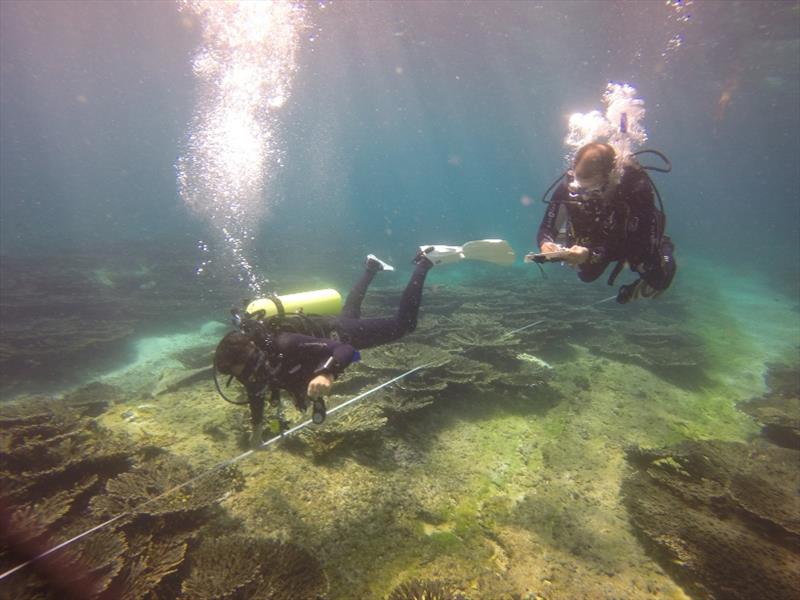
Nature fighting back: Maldives reefs showing resilience
by Dr. Matthias Hammer 2 Oct 2019 04:30 UTC

Citizen scientists surveying a reef near Muscat © Biosphere Expeditions
Biosphere Expeditions, the Marine Conservation Society, Reef Check Maldives and local Maldives environmental group Save the Beach Maldives have just returned from a 250 km expedition around the central Maldives, the ninth annual survey of its kind sine 2010. They found, against expectations, that corals are showing some resilience, adaptability and even recovery from climate change effects.
Reefs the world over are dying from rising sea temperatures, ocean acidification, pollution and overexploitation. The situation is much the same in the Maldives, as previous Biosphere Expeditions surveys and a very recent scientific paper have shown.
So the expedition scientist (and co-author of the recent paper) Dr. Jean-Luc Solandt this year expected more dead and dying reefs. But what he and his team of citizen scientists found instead are signs of hope and recovery.
Dr. Solandt: "We were devastated in 2016 when a global warming event killed off large swathes of the reefs. The reefs showed little recovery in 2017 and 2018, and we expected more bad news in 2019. However, this year we saw many baby (<1 year) and young corals (1-3 years), as well as different species of corals growing vigorously at sites that we expected to be dead or dying. It was surprising and encouraging to see a greater diversity of corals 'pushing through' from the dead layer below. It seems nature is fighting back with a coral diversity explosion. We have seen resilience (of corals that are resistant to bleaching), adaptability (some reefs have other species coming through) and recovery (baby corals are almost everywhere) this year", concludes Solandt.
"It's not all plain sailing, though;", adds Solandt, "many reefs are still very badly affected and some have died altogether. And another temperature spike would kill many of the new corals we've seen. Also, some small corals that had settled on the reef in the last year, which we thought were resistant to bleaching, were now bleached, but the larger ones seem OK. Finally, the background temperature is still 'hot' at the bleaching threshold of 30 degrees Celsius in very shallow water."
The recent change in government in the Maldives is another cause for some optimism. Hussein Zahir, head of LaMer, one of the expedition's local partner organisations, notes that the government has indicated that it "understands the close link between oceans, climate change and the wellbeing of communities. This is a good start, as is the establishment of a National Research Institute that includes environment, health and social issues - a sort of think-tank and an infrastructure for science-based knowledge and understanding of the issue. And apparently the income from the Green Tax that has been levied on the tourism sector, will now be spent exclusively on the environment".
One of the outstanding sites regularly visited by the annual Biosphere Expeditions surveys called 'Rasdhoo Madivaru', has also recently been declared a Marine Protected Area. It is both resilient to the worst bleaching effects, and harbours large megafauna such as sharks, manta rays, turtles and Napoleon wrasse. "Our expeditions have highlighted this site for the past nine years, as being of extraordinary biodiversity value", says Solandt.
Dr. Matthias Hammer, Executive Director of Biosphere Expeditions believes that "all those involved in the last nine years of expeditions - from professional to citizen scientists to local and international partners - can be very proud about the in-depth understanding and description of bleaching patterns we have reached and that we have been involved in the designation of an MPA. This is yet another feather in our cap of achievements through citizen science and community-based conservation, and an important stepping stone for tackling the adverse effects of climate change in the Maldives. It shows how ordinary people and grassroots action can make a difference".
Further surveys will be carried out by Save the Beach Maldives and Reef Check Maldives. These local organisations, the latter created by graduates of the Biosphere Expeditions placement programme, will "also train more local divers to survey their own reefs in the future, and set up more community-based reef conservation efforts", according to Hassan 'Beybe' Ahmed, a placement programme graduate who runs Save the Beach Maldives and Reef Check Maldives. The Biosphere Expeditions annual survey will return to the Maldives in August next year.